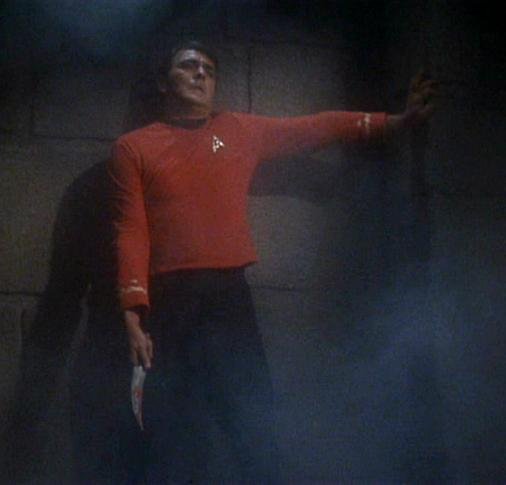Television Review: Wolf in the Fold (Star Trek, S2X07, 1967)

Robert Bloch (S02E07)
Airdate: December 22nd 1967
Written by: Robert Bloch
Directed by: Joseph Pevney
Running Time: 50 minutes
Star Trek: The Original Series (TOS) has, since its 1966 debut, cultivated a fervent, multigenerational fanbase, its enduring appeal rooted in Gene Roddenberry’s vision of a utopian future defined by rationality, inclusivity, and interstellar cooperation. Yet, for all its progressive credentials, the franchise has not escaped criticism. Among its detractors, radical feminists have long scrutinized the original series, arguing that its portrayal of women—particularly in episodes like Season 2’s Wolf in the Fold—exposes a regressive undercurrent beneath Roddenberry’s enlightened veneer. While TOS is lauded for breaking barriers in diversity, its handling of gender often feels anachronistically crude, with female characters frequently reduced to sexualized victims or peripheral figures. For modern “woke” audiences steeped in discourses of equity and representation, episodes like Wolf in the Fold—with their reliance on exploitative tropes and patriarchal assumptions—risk alienating viewers, prompting calls for the series to be “cancelled” or memory-holed to obscurity. Yet, to dismiss the episode outright would be to overlook its genre-bending ambition, technical craftsmanship, and the uneasy tension between its problematic elements and its thematic resonance.
Wolf in the Fold marked the final contribution of Robert Bloch, the horror luminary behind Psycho, to the Star Trek canon. Bloch’s penchant for psychological terror and macabre twists permeates the episode, particularly in its slasher-film-inspired opening. The narrative begins deceptively lightly, with Kirk, McCoy, and Scott indulging in R&R on Argelius IV, a planet famed for its pacifist, hedonistic culture and progressive attitudes toward sex. Scott’s encounter with Kara (Tania Lemani), a mesmerizing belly dancer, sets the tone: her performance—a blend of sensuality and artistry—distracts him before culminating in her brutal murder. Found with a bloodied knife and no memory of the crime, Scott faces execution under Argelia’s harsh justice system. The plot escalates as two more women—Lt. Karen Tracy (Virginia Alridge) and priestess Sybo (Pilar Seurat)—are stabbed to death, Scott again implicated. During a séance, Sybo warns of “Redjac,” an ancient, non-corporeal entity that feeds on fear and once manifested as Jack the Ripper on Earth. The climax sees the crew of the Enterprise battling to expel Redjac, now possessing Argelian Commissioner Hengist (John Fiedler), through a blend of scientific ingenuity and psychological subterfuge.
Critics have long lambasted the episode for its derivative plotting. Bloch’s use of Jack the Ripper, a figure he himself explored in his short story Yours Truly, Jack the Ripper (adapted into a 1961 episode of Thriller television anthology series), feels less a bold homage than a creative shortcut. The decision to imbue Redjac with supernatural traits jars against Star Trek’s hard-science ethos, creating a tonal dissonance that undermines the franchise’s commitment to rationalism. Yet the episode’s most egregious flaw lies in its treatment of women. Kara’s character—seductive, sexually liberated, and ultimately a victim—conforms to slasher-film archetypes, her murder framed as both titillating and inevitable. Spock’s clinical assertion that women are “more suitable” victims for Redjac due to their “heightened fearfulness” reinforces regressive gender stereotypes, framing female vulnerability as biologically inherent. These choices reflect the era’s casual misogyny but clash starkly with contemporary sensibilities, rendering the episode a lightning rod for feminist critique.
The portrayal of Argelius IV further complicates the episode’s legacy. The planet’s depiction as a hedonistic, “primitive” society—replete with Eastern-inspired mysticism and uninhibited sexuality—echoes Orientalist tropes that exoticise and infantilize non-Western cultures. While Argelia’s absence of violence positions it as morally superior to 1960s Earth, its inhabitants are rendered one-dimensionally, their civilization reduced to a backdrop for the plot’s horrors. This paradox—whereby Argelians are simultaneously idealised and Othered—reveals the series’ struggle to reconcile its utopian ideals with the cultural biases of its time.
Yet Wolf in the Fold is not without redeeming qualities. Director Joseph Pevney navigates the episode’s repetitive structure with aplomb, sustaining tension through cyclical murders and an extended courtroom sequence that consumes nearly a fifth of the runtime. The cast rises to the occasion: Lemani’s hypnotic dance sequence anchors the opening with visceral allure, while James Doohan delivers one of his most nuanced performances as the tormented Scott, his anguish palpable beneath stoic bravado. John Fiedler’s portrayal of Hengist-as-Redjac—his voice trembling with malevolent glee—adds chilling gravitas, his final moments a masterclass in understated menace.
The episode’s climax, however, is its crowning achievement. McCoy’s deployment of mind-altering drugs to shield the crew from Redjac—a twist that nods to the burgeoning psychedelic counterculture of the late 1960s—serves as both a logical counter to the entity’s malice and a metaphor for the power of human adaptability. The resolution’s light-hearted coda deftly balances the narrative’s dark themes with Star Trek’s trademark optimism. This tonal dexterity allows Wolf in the Fold to transcend its flaws, offering a narrative that grapples with existential evil while affirming the resilience of rationality and camaraderie.
Wolf in the Fold is a polarizing entry in Star Trek’s canon—a work of its time that oscillates between progressive ambition and regressive tropes. Its handling of gender and cultural representation invites legitimate criticism, particularly from feminist and postcolonial perspectives. Yet its genre-blending audacity, directorial finesse, and thematic richness render it a compelling artifact of 1960s science fiction.
RATING: 7/10 (+++)
Blog in Croatian https://draxblog.com
Blog in English https://draxreview.wordpress.com/
InLeo blog https://inleo.io/@drax.leo
InLeo: https://inleo.io/signup?referral=drax.leo
Leodex: https://leodex.io/?ref=drax
Hiveonboard: https://hiveonboard.com?ref=drax
Rising Star game: https://www.risingstargame.com?referrer=drax
1Inch: https://1inch.exchange/#/r/0x83823d8CCB74F828148258BB4457642124b1328e
BTC donations: 1EWxiMiP6iiG9rger3NuUSd6HByaxQWafG
ETH donations: 0xB305F144323b99e6f8b1d66f5D7DE78B498C32A7
BCH donations: qpvxw0jax79lhmvlgcldkzpqanf03r9cjv8y6gtmk9